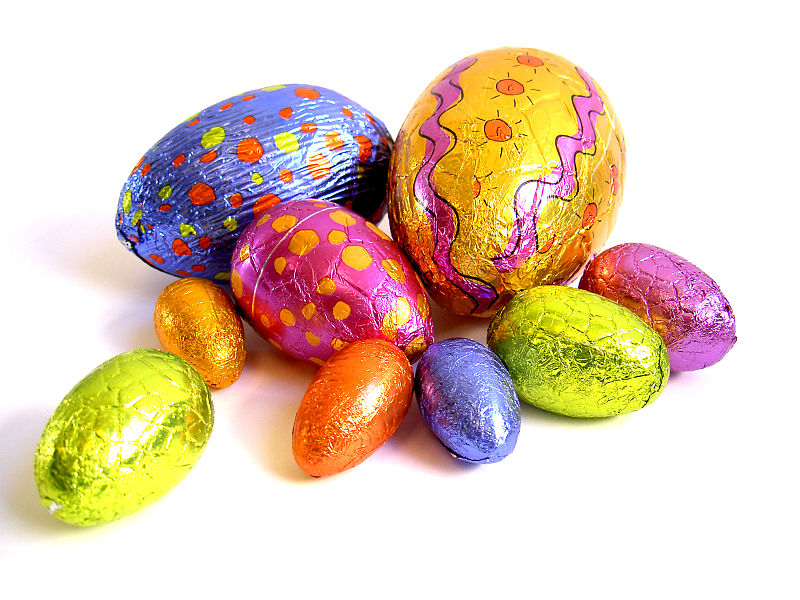It always baffles me that people do not question things. They perpetuate certain ‘traditions’ simply because they grew up keeping it, their parents kept it, their grandparents kept it and so on. I guess human beings really are like sheep, they follow blindly.
No-one stops to take a good long look at the said traditions and question it. I mean, seriously, what does a big fat man in a red suit, a fir tree and holly leaves have to do with the birth of Christ? Similarly, what do Easter bunnies, eggs and hot cross buns have to do with the death and resurrection of Christ? Nothing! Where in the Bible does it mention Easter bunnies, Easter eggs or hot cross buns? Nowhere! Well, to be fully accurate, the word ‘Easter’ does appear one time in the Bible. However, this was due to a mistranslation of the word Pascha in the Greek language, which comes from the Hebrew word, Pesach. Pascha / Pesach are words for Passover. So this reference to Easter was actually referring to Passover. Nowhere else is there a mention of Easter. So if Easter is not in the Bible, where does the name Easter come from?
I am going to attempt to shed some light on the subject. Now this is quite a heavy topic when one gets into it, but I am going to try and keep it as simple as possible.

The early Christians did not celebrate Easter. They commemorated Passover. In the Old Testament Passover was in remembrance of the Israelites deliverance from Egypt. During the ten plagues, the plague of death of the firstborn meant the angel of death would visit all homes in Egypt and kill the firstborn. The Israelites were instructed to kill a young lamb and paint the blood of that lamb on their doorposts which would protect the home and the firstborn and the death angel would ‘pass over’ their house, only taking the firstborn of the Egyptians.
Moving forward in time to the New Testament, Christ, seen as the Lamb of God or sacrificial lamb, sacrificed his life and shed his blood for mankind’s sins. The commemoration of Passover shifted to the remembrance of Christ’s sacrifice to protect and save His people. Symbols of bread (for Christ’s broken body) and wine (for Christ’s blood) became part of the Passover tradition.
Easter was nowhere on the radar! In fact, according to the Bible, the Church was commanded to continue to observe Passover. However, somewhere along the line Easter replaced Passover. Many Christians view Passover as a purely Jewish tradition. Yet it is clear in the Bible, that early Christians celebrated Passover.
So… how did Easter and Passover end up merging?
Like Christmas and many other common traditions, Easter also has its roots firmly planted in paganism. Pagan religions celebrated the beginning of spring and worshipped the goddesses that symbolised spring, fertility and rebirth. The Anglo-Saxon goddess Eostre (from where the name Easter comes from) and the German Ostern or Ostara were some goddesses that were worshipped and festivals were held to welcome the return of spring that these deities were believed to bring. In Babylonia the goddess of spring was called Ishtar (also coincidentally where the name Esther comes from). There are many more names of spring goddesses, but they were all essentially the same goddess, just called different names by different cultures.

As for bunnies and eggs – these were pagan symbols for fertility and birth and tied in with spring, a season for the earth’s ‘rebirth’. Rabbits were viewed as highly fertile creatures (hence the phrase ‘breeds like rabbits!’). Eggs were symbolic of birth.
The Roman Catholic Church ‘Christianised’ these pagan celebrations by tying it to Christ’s resurrection and the Easter egg became a symbol of Christ’s resurrection or ‘rebirth’. Sunrise services on Easter Sunday also relates to pagan sun worship which took place at sunrise. Hot cross buns are eaten in many parts of the world during Easter. This too came from the pagan practice of offering sweet cakes to the spring goddesses and later on Christians adopted the practice and placed a cross on the buns symbolising Christ’s crucifixion. Throughout history the Roman Catholic Church has ‘Christianised’ many pagan customs, but it has not managed to find a Christian explanation for the Easter Bunny! To insult our intelligence even further, the story we feed our young children about the Easter Bunny bringing baskets of brightly coloured Easter Eggs. Umm… has anyone stopped to think about it… rabbits don’t lay eggs!
Despite its pagan history, Easter is still regarded as one of the holiest celebrations on the Christian calendar and many will be stocking up on Easter eggs for the kids and enjoying their hot cross buns. Centuries of misled tradition will not be broken.
Many Christians reason that the origins of certain practices and festivals is neither here nor there, it’s the reason for celebrating it that matters. If that’s the case, hopefully the reason behind Easter, i.e. Christ’s death and resurrection, is what is top of mind for those who believe.
This article is not meant to knock Christians or Christianity. I too am Christian (although admittedly not a very committed and practising Christian at this point in time). I’m just someone (who is fundamentally Christian at heart) who chooses to question things.
“Question everything. Every stripe, every star, every word spoken. Everything.”
~ Ernest Gaines ~
